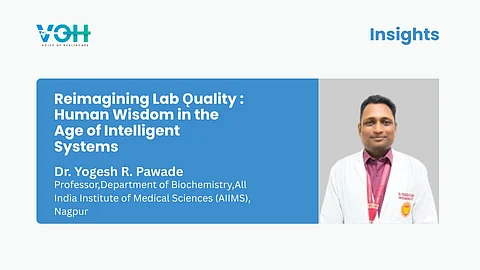

Introduction
Laboratories are rapidly evolving from manual operations to innovation hubs driven by AI and automation, enhancing efficiency, accuracy, and compliance. This shift necessitates rethinking the role of human expertise in quality assurance, emphasizing the integration of technology with professional wisdom.
The Technological Renaissance in Laboratory Medicine
AI revolutionizes diagnostics by processing vast datasets and recognizing complex patterns. As Topol (1) states, AI can analyze images, biochemical data, and predict disease trajectories on par with or surpassing human experts. For example, Emu M et al. (2) in 2023 demonstrated AI's 92% accuracy in detecting early liver fibrosis from blood tests, reducing invasive biopsies. Machine Learning (ML) further boosts accuracy by identifying subtle anomalies human eyes might miss (3), acting as an early warning system in biochemical workflows to prevent error propagation.
Automation complements AI by standardizing procedures, reducing variability and human error, and increasing throughput. Automated systems streamline workflows, ensuring rapid turnaround and adherence to standards like ISO 15189 (4). A 2024 International Laboratory Automation Association (ILAA) survey reported fully automated labs saw a 35% reduction in turnaround time and a 25% decrease in pre-analytical errors (5).
Redefining Ǫuality Assurance in the Digital Age
Traditional lab quality assurance relied on manual checks. Now, AI and automation enable continuous, real-time quality monitoring. Predictive analytics can instantly flag performance deviations, allowing prompt corrections. Khan et al (6) emphasize that "the integration of AI-driven quality control tools has shifted laboratory management from reactive to proactive." While these tools validate data and reduce errors, technology alone is insufficient. Plebani M et al (4) highlights that human judgment remains crucial for contextualizing results, understanding patient nuances, and making ethical decisions, distinguishing true pathology from anomalies.
The Human Element: Wisdom, Ethics, and Trust
AI cannot replace the clinical judgment, empathy, and ethical considerations of lab professionals. Obermeyer and Emanuel (7) assert that AI and ML are tools to augment, not replace, clinical reasoning. Lab professionals become stewards, overseeing AI outputs and validating results to ensure patient safety and ethical alignment. Heying X et al. (8) warn that "without human oversight, the risk of misinterpretation and over-reliance on automated outputs increases, potentially compromising patient safety," advocating for a collaborative model where humans retain ultimate responsibility. Human oversight is also vital for maintaining trust in lab results, ensuring data integrity within the broader clinical narrative, and requiring transparency about AI's role.
Harmonizing Innovation with Wisdom
Reimagining lab quality requires harmonizing technology and human expertise:
Training and Education: Lab professionals need new training that covers data science, AI literacy, and ethics, similar to what collaboration initiatives are already developing (G).
Collaborative Workflow Design: Seamlessly integrating AI with clear human oversight protocols.
Ethical Governance: Establishing frameworks for AI deployment aligned with patient safety and privacy.
Continuous Ǫuality Improvement: Using AI insights for ongoing refinement while valuing human feedback.
The future of laboratory medicine hinges on the effective synergy between human expertise and intelligent systems. This ensures that new advancements improve, rather than reduce, the fundamental principles of healthcare, like patient well-being and ethical practice (10).
Conclusion
Ultimately, the future of laboratory medicine lies in a symbiotic relationship between human wisdom and intelligent systems. By integrating AI and automation with ethical vigilance and ongoing education, laboratories can achieve excellence, through a blend of cutting-edge science and a profound understanding of the human element in healthcare.